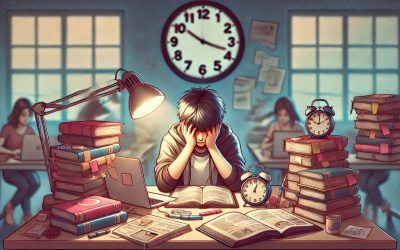5 Daily Habits That Could Be Making Your Anxiety Worse
Anxiety is a common mental health issue that many people struggle with daily. While various factors contribute to anxiety, certain habits can exacerbate the condition. As a therapist, I’ve observed patterns in my clients’ lives that often amplify their anxiety. Here are five habits that could be making your anxiety worse and some tips on how to address them.
1. Overconsumption of Caffeine
Why It’s Harmful:
Caffeine is a stimulant found in coffee, tea, energy drinks, and certain medications. While it can provide a temporary energy boost, it also stimulates the “fight or flight” response in your body, which can mimic or worsen anxiety symptoms.
Solution:
Consider reducing your caffeine intake or switching to decaffeinated options. Monitor how your body responds and gradually cut back if you notice a decrease in anxiety.
2. Excessive Screen Time
Why It’s Harmful:
Spending too much time on screens, especially on social media, can lead to increased feelings of anxiety. The constant bombardment of information, negative news, and social comparisons can contribute to feelings of inadequacy and stress.
Solution:
Set limits on your screen time, particularly before bed. Establish screen-free times during the day to engage in other activities such as reading, exercising, or spending time with loved ones.
3. Lack of Physical Activity
Why It’s Harmful:
A sedentary lifestyle can contribute to anxiety. Physical activity helps release endorphins, which are natural mood lifters. Lack of exercise can result in a build-up of stress and tension in the body, exacerbating anxiety.
Solution:
Incorporate regular physical activity into your routine. Even a daily 30-minute walk can make a significant difference in your mood and anxiety levels. Find an activity you enjoy and make it a part of your daily life.
4. Poor Sleep Hygiene
Why It’s Harmful:
Sleep and anxiety are closely linked. Poor sleep can increase anxiety levels, and anxiety can interfere with sleep, creating a vicious cycle. Inadequate rest can impair cognitive function and emotional regulation.
Solution:
Establish a consistent sleep schedule by going to bed and waking up at the same time each day. Create a relaxing bedtime routine, avoid screens before bed, and ensure your sleep environment is comfortable and free of distractions.
5. Negative Self-Talk
Why It’s Harmful:
The way you talk to yourself significantly impacts your mental health. Negative self-talk can fuel anxiety by reinforcing feelings of self-doubt, fear, and worry. Constantly predicting negative outcomes can increase stress levels.
Solution:
Practice mindfulness and positive affirmations. Challenge negative thoughts by questioning their validity and replacing them with positive, constructive thoughts. Consider keeping a journal to track negative thoughts and reframe them in a more positive light.
Addressing these habits can help manage and reduce anxiety. It’s essential to recognize and modify behaviors that contribute to your anxiety levels. If you find it challenging to make these changes on your own, seeking help from a mental health professional can provide additional support and strategies. Remember, small, consistent changes can lead to significant improvements in your mental well-being.














